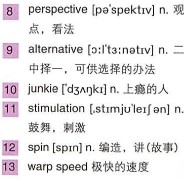别误会,这里说的“熊猫人”不是指周董那雷人的电视剧主角,而是指那些慢慢吞吞、做事特别“磨”的慢郎中。犯一条者,属轻度感染群;犯七条,恭喜你,已荣升为一级国宝!
美式发音 适合精读
With a twist to the common list of habits that are useful to establish, here are seven habits that you do best to avoid. I’ve dabbled with all of them quite a bit. Not surprisingly I didn’t get much of the important stuff done.
与通常所列举的应该培养的好习惯不同,本文指出的是我们最好避免的七种习惯。我也曾沾染这种种陋习,结果毫无疑问,那些重要的事情没有几件可以完成。
 1. Not showing up.
1. Not showing up.
Maybe you’ve heard this quote by 1)Woody Allen:
“Eighty percent of success is showing up.”
One of the biggest and simplest things you can do to ensure more success in your life—whether it be in your social life, your career or with your health—is simply to show up more. If you want to improve your health then one of the most important and effective things you can do is just to show up at the gym every time you should be there. If you write or paint more, each day perhaps, you will improve quickly. If you get out more you can meet more new friends. If you go on more dates your chances of meeting someone special increase.
1. 缺席。
也许你曾经听过伍迪·艾伦所说的这句话:
“成功因素八成源自于参与。”
只要积极参与。要保证你在生活中——无论是在社交生活、工作事业还是健康状况上——能取得更多的成功,这是你所能做的最关键也是最简单的事情之一。如果你想要改善你的健康状况,你能做的最重要,也是最有效的一件事就是,在每次你该去的时候就出现在健身房里。如果你每天都坚持写作或绘画,你就会进步神速。如果你出门次数增多,你就可以遇到更多的新朋友。如果你参加更多的约会,你遇到心上人的机会也会跟着提高。
2. 2)Procrastinating half the day.
To keep it short, my three favorite ways to get out of a procrastinating state are:
—Swallow that frog. What this means is simply to do the hardest and most important task of the day first thing in the morning. A good start in the morning lifts your spirits and creates a positive 3)momentum for the rest of the day. That often creates a pretty productive day.
—How do you eat an elephant? Don’t try to take it all in one big bite. It becomes overwhelming, which leads to procrastination. Split a task into small actionable steps. Then just focus on the first step and nothing else. Then move on to the next step.
—The 4)Get around to It Paraliminal. I find this guided 5)meditation to be very useful. After 20 minutes of mostly just lying on my bed and listening I’m far more productive for a few days. I don’t feel the urge to sink into that procrastinating state, or the need to find out what’s new over at one or five of my favourite websites.
2.拖拖拉拉浪费半天。
为了简化,我将最喜欢的三种摆脱拖拉状况的方法列举如下:
——吞食青蛙。也就是说早上一开始就该着手当天最艰难最重要的工作。早上一个好的开始会让你当天其余时间都保持高昂的情绪和积极的动力。这通常会使你这一天都十分高效。
——你如何吃掉一头大象呢?不要打算一口吃成胖子,这会使你感到不堪重负以至于产生拖延的念头。把一项工作分为若干可付诸于行动的小步骤,然后仅仅关注第一步,其他搁一旁,接下来再继续下一步。
——《静思》。我发现这种导向型的静思十分有效。就在我花了20分钟只躺在床上静心聆听后,一连几天我都十分高效。我不再有陷入拖拉状况的倾向,或者渴望流连于一至五个我喜爱的网站寻找更新信息。
3. When actually doing something, doing something that isn’t the most important thing right now.
To be effective you probably need some kind of time- management system. It might be something really simple, like using the 80/20 rule at the beginning of each day. The 80/20 rule, or the Pareto principle as it’s also known, says that you’ll get 80 percent of your results from only 20 percent of your tasks and activities. So you need to focus most of your energy on those few important tasks to be effective.
3.埋头苦干,尽是无关紧要之事。
为了提高效率你也许需要某种时间管理方法。它可能会是一个极为简单的方法,比如在一天的开始使用80/20法则。80/20法则,也称帕累托法则,认为80%的收获只源自20%的事务和努力。所以为求高效你应该将大部分的精力集中在那些极少数重要的事情上。
4. Thinking too much.
And thereby seldom taking action. 6)Paralysis by analysis can waste years of your life. There is nothing wrong with thinking before you do something. Do some research, make a plan, explore potential upsides and problems.
But 7)compulsively thinking and thinking and thinking is just another way to waste your time. You don’t have to examine everything from every angle before you try it. And you can’t wait for the perfect time to do something. That time never comes.
4.多虑。
因为多虑而很少采取行动。陷于无穷的分析之中只会使你虚度光阴。行动之前加以思考并没有错。做一些调查研究,制定计划,探究潜在的积极以及不利因素。
但是强制性的反复思考就会成为另外一种浪费时间的做法。在尝试之前你没有必要去从每一个角度研究每一件事情。而且你也不可以等到一个最佳的时刻再去做事,因为这样的时刻从来不会出现。
5. Seeing the negative and downsides in just about anything.
When you see everything from a negative8)perspective you quickly punch a hole in your own motivation. You find faults everywhere and problems where there are really none. You cling to details. If you want to find a reason to not do something, then that’s no problem. From a negative viewpoint you can find ten reasons every time.
A solution is to realise the limits of a negative perspective. And that your perspective isn’t some kind of 100% true picture of the world. Then try other perspectives. For instance, trying to establish a habit of seeing things in a more positive and optimistic light can be quite useful.
5.凡事过于消极。
如果你凡事都从消极方面考虑,你的积极性就会大受打击。你会发现到处都是问题和错误,而这些问题其实是不存在的。你抓住细节不放。如果你想要寻找一个不干某事的理由,这当然没有问题。因为如果从一个消极角度考虑,每次你都可能找出十个借口。
对此的一个解决方法就是了解消极看法的局限,认识到你的看法并不是这个世界百分百的真实写照。然后不妨尝试一些其他的角度。举例来说,你可以尝试着培养一下凡事从更为积极和乐观的角度思考的习惯,这会对你大有帮助。
6. Clinging to your own thoughts and being closed to outside influences.
It can be hard to admit that what you thought or believed was not the best 9)alternative. So you cling to your thoughts harder and harder and keep your mind closed. This makes it hard to improve and for instance to become more effective.
One solution, obviously, is to open up more. To open up and learn from the mistakes of others, from your own mistakes and from other sources like books. Don’t get stuck in reading, in just taking in new information, either, or you might become a self-help 10)junkie. Use the new information, put what you have learned into action and try it out.
6.固执己见,与世隔绝。
人们很难去承认自己的想法不是最佳选择,因此你越来越执着于自己的想法,变得闭目塞听。这会让你很难取得进步,比如说效率难以提高。
显然,解决方法之一就是打开心胸。开阔视野,从他人和自己的错误中汲取教训,从书籍等其他资源中获取知识。不要迷信书本,也不要盲目追求新的信息,否则你就会成为一个沉迷于自救的人。运用那些新信息,把你学到的付诸行动,然后加以检验。
7. Constantly on information overload.
With “information overload,” I don’t just mean that you read a lot. I pretty much mean an overload in all input. If you just let all information flow into your mind it will be hard to think clearly. It’s just too much 11)stimulation. A few more potential downsides to this habit are:
—Some of the input you receive will be negative. The media and your surroundings often put a negative 12)spin on things for various reasons. If you aren’t selective in what input you want in your life, then you’ll be dragged into this negativity too. If everyone else is procrastinating or is anxiously keeping themselves busy by doing low-priority tasks at 13)warp speed, it’s easy to be influenced by that mood.
—It creates an urge to keep up with what’s happening but there are always ten more things happening so you can’t keep up. This makes life stressful.
When you work, shut out as many distractions as possible. Shut off the phone, Internet and shut the door. To be able to focus, think more clearly and take action; it’s useful to be more selective in what you let into your mind.
7.持续信息过剩。
我这里说的“信息过剩”,并不只是说你过多的阅读,我所指的主要是所有输入信息的过剩。如果你让所有的信息都涌进大脑,这会导致难于清晰思考,因为刺激源太多了。以下就是这种习惯可能会存在的弊端:
——你所接受的一些信息也许会是消极的。媒体和周围环境会因种种原因对事情提出消极的论述。如果你没有根据生活所需对信息加以筛选,你也会陷入消极之中。如果周围的所有人都在拖延或者焦急地忙于各种非重要的事情时,你会很容易被这种情绪所影响。
——这会使你忙于追赶当下发生的事情,然而在你的关注外总有更多的事在不断发生,你不可能一一赶上。你的生活会因此充满压力。
当你工作时尽可能地避免那些分散注意力的事物。关掉电话,断开网络,关上大门。为了可以集中精力,清晰思考并付诸行动,你就需要在吸取信息时更有选择性。
![]()



推荐:徐维维
编译:柳叶
